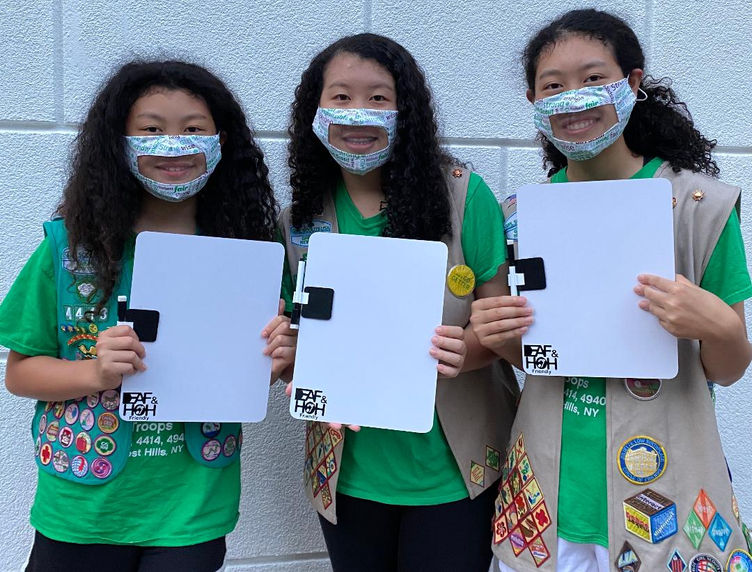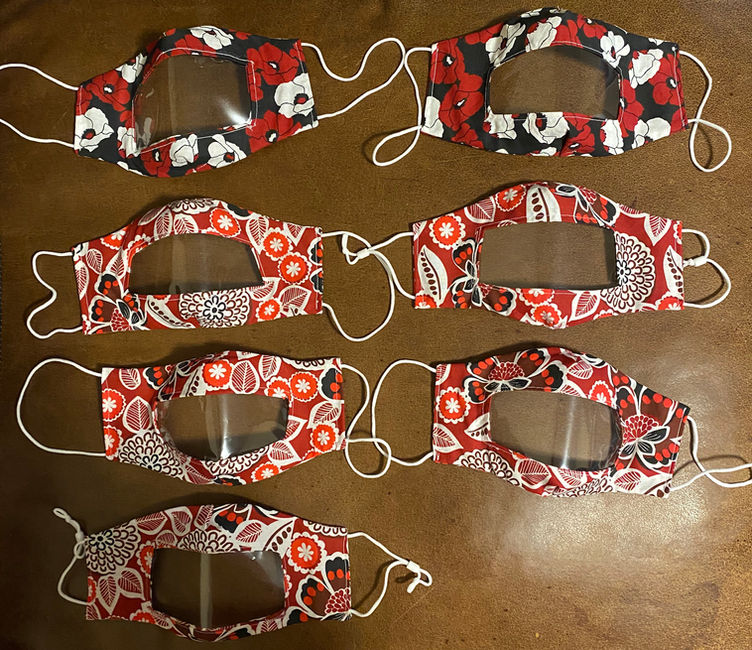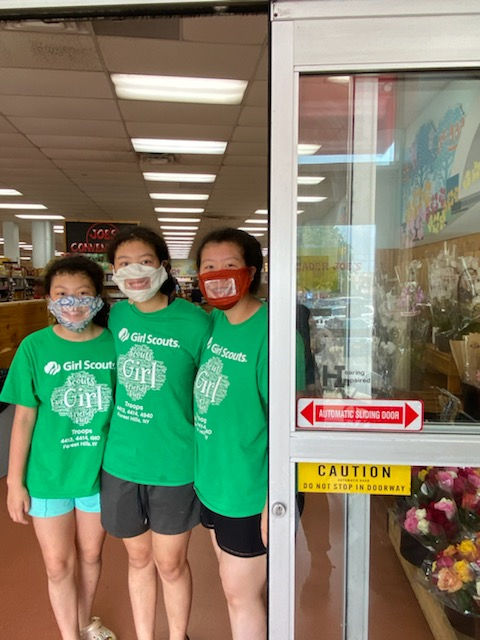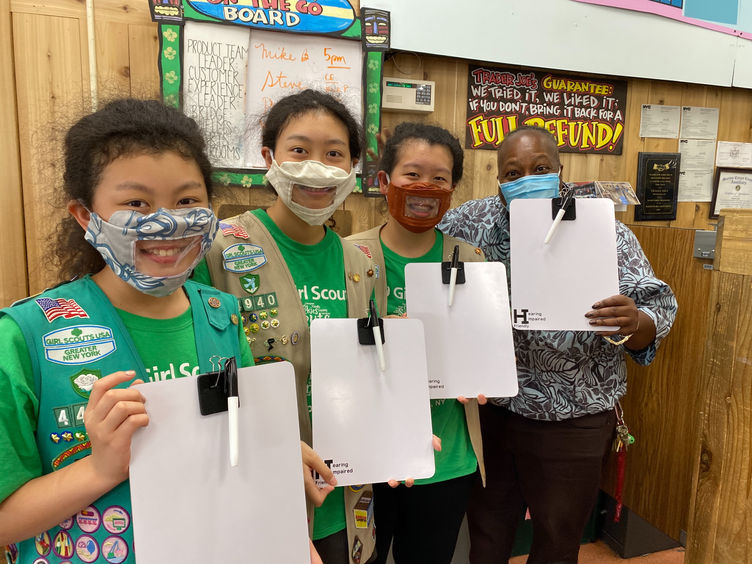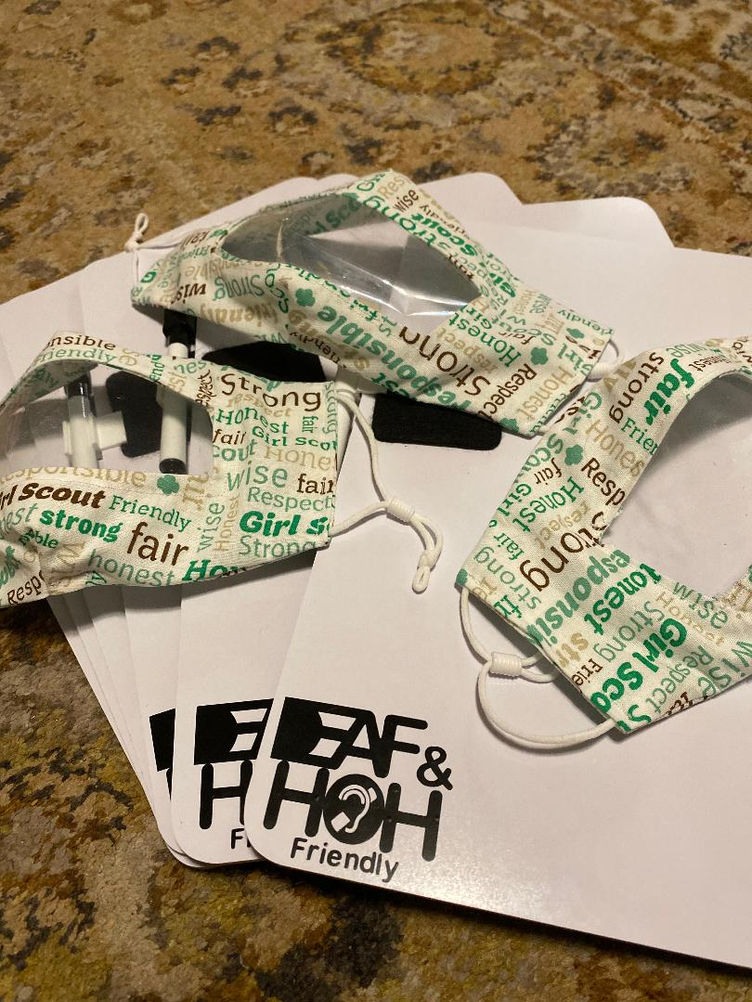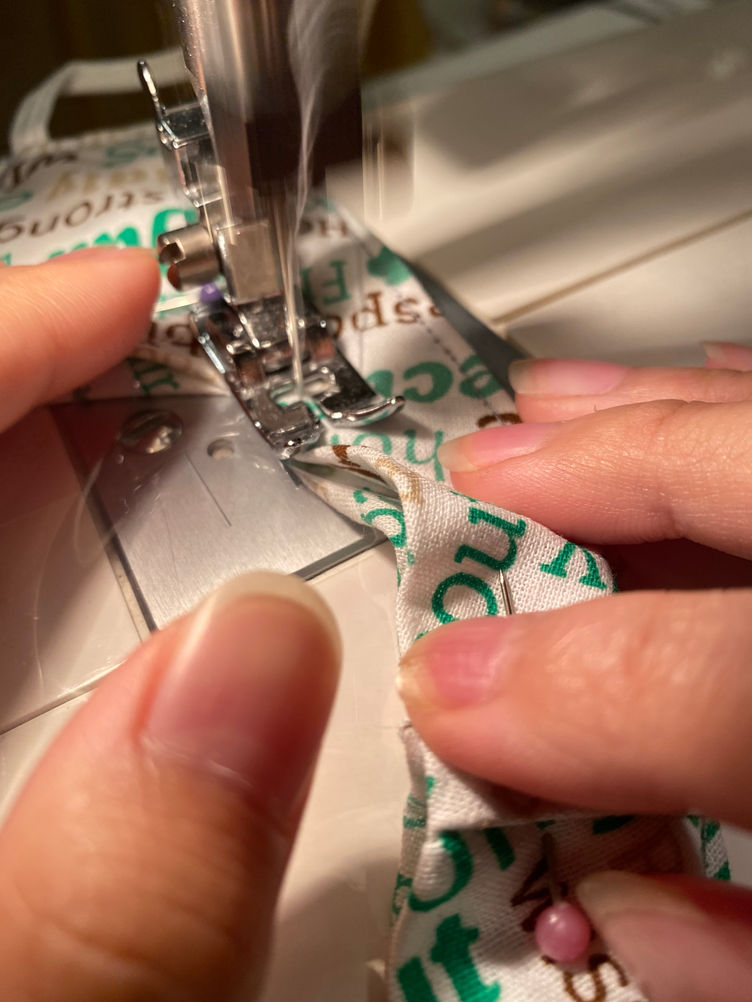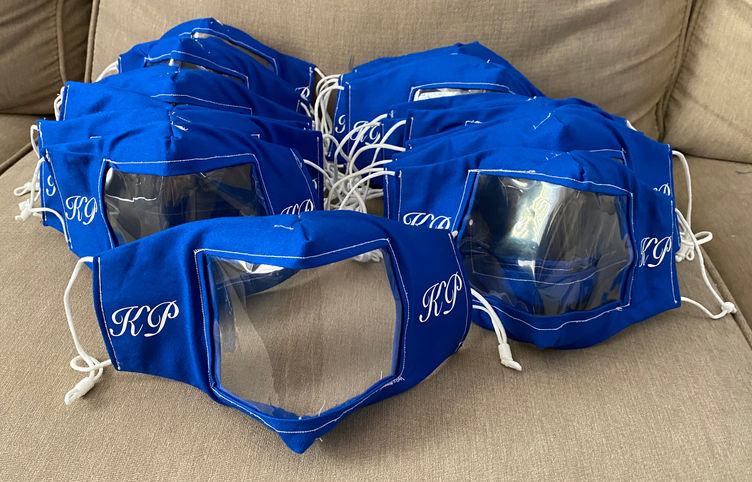
_JPG.jpg)
TOGETHER WE CAN
Spreading awareness about facilitating communication with the Deaf and Hard of Hearing.
Together we can make the world Deaf and Hard of Hearing Friendly
About Us
We are 3 sisters in Queens, New York. We've been Girl Scouts since we were 5 years old, with a mission to fulfill the Girl Scout Promise, to help people, our community, and make the world a better place.
During the Coronavirus pandemic, we noticed that the Deaf and hard of hearing community are being isolated and left out in this crisis. As a defense against coronavirus, face masks have become the new public norm, but face masks hinder communication for people who are deaf or hard of hearing. Mouth movements and facial expressions can't be seen with masks on, which are helpful cues to basic communications for the Deaf and hard of hearing.
Our mom has hearing loss and has had difficulty communicating with others especially during the pandemic. Finding a solution to facilitate communication for the Deaf and hard of hearing during this challenging time is personal and important to us.
Our Mission
According to Johns Hopkins Cochlear Center for Hearing and Public Health, approximately 38.2 million Americans (14.3 percent) report some degree of hearing loss.
According to the Hearing Loss Association of America, approximately 48 million Americans have some degree of hearing loss.
Not many people are aware of how difficult it is for the Deaf and hard of hearing to communicate with others, even more during this pandemic.
Our mission is to spread awareness and also provide educational resources and tools to the community to help improve communication with the Deaf and hard of hearing community.
Deaf and Hard of Hearing (DHOH) Friendly Initiative
Our goal is to help businesses and the community become 'Deaf and hard of hearing friendly'.
As part of our Girl Scouts Gold and Silver Award take action project, we came up with some tools that will help businesses communicate with the Deaf and hard of hearing. Since the inception of our initiative in July 2020, we've made and provided customized communication boards and fabric masks with clear panels to businesses for free.
Our website serves as an educational resource for businesses and the community and can be used for 'Deaf and hard of hearing friendly' staff training.
We contacted and worked with our community businesses to help them integrate this initiative into their routines so that the Deaf and hard of hearing can be included.
We hope that you can help our cause and spread awareness to make the world Deaf and hard of hearing friendly.
Our Team
We thank all of our volunteers, supporters, Girl Scouts of Greater New York and Girl Scouts of the USA, Forest Hills Chamber of Commerce, businesses, the community, and our project advisor, Dr. Suzanne Bentley, who have supported our initiative and dedicated their time to ensure that our mission and goal to make businesses, the community and eventually, the world, Deaf and hard of hearing friendly.
Thank you for your help!
Businesses that have implemented our Deaf and hard of hearing Friendly initiative:
Trader Joe's on Metropolitan Avenue, Forest Hills
Kweller Prep, Forest Hills
Kids Only Dental, Forest Hills
Arbitman Orthodontics, Forest Hills
House Of Playful Souls, Forest Hills
Aigner Chocolates, Forest Hills
Staples, Forest Hills
CVS, Metropolitan Avenue, Forest Hills
Post Office, Metropolitan Avenue, Forest Hills
Home Depot, Forest Hills
Dicks Sporting Goods, Forest Hills
Sterling Pharmacy, Kew Gardens
Audiology & Hearing Aid Solutions, New Jersey
New Explorations into Science, Technology & Math (K-12 School), New York
We have partnered with over 40 business and will update the list soon...
As of October 2024, the Deaf and HOH Friendly Team has made and donated:
100+ customized communication boards and
200+ clear panel masks and counting!!
Business who have provided materials and funding for our Deaf and hard of hearing Friendly Initiative:
Trader Joes, Forest Hills, NY
Maspeth Federal Savings Bank, Forest Hills, NY
Frette Company
Kweller Prep
Herb DeCordova & Bethel Dry Cleaner
Audiology & Hearing Aid Solutions
Deaf and Hard of Hearing Statistics
Hearing loss is the third most common physical condition in the United States behind arthritis and heart disease, affecting people of all ages.
The National Institute on Deafness and Other Communication Disorders states "approximately one in three people in the United States between the ages of 65 and 74 has hearing loss, and nearly half of those older than 75 have difficulty hearing."
Over 5% of the world’s population – or 466 million people – has disabling hearing loss (432 million adults and 34 million children). It is estimated that by 2050 over 900 million people – or one in every ten people – will have disabling hearing loss.
According to Hearing Loss Association of America, around 60.7 million people in the US have some degree of hearing loss which means 1 in 15 Americans experience hearing difficulties. Around 11 million or 3.6 percent of US population consider themselves deaf or with severe hearing loss. Hearing loss is on the rise and expected to double by 2060.
.jpeg)


DHOH Friendly Awareness Team with Trader Joe's Manager, Carol Wrenn




Sarah is a 2nd-year Ambassador Girl Scout. She has earned her Girl Scout Bronze, Silver and Gold Award. Sarah is an aspiring artist and a published illustrator for a medical journal. She is a go-getter and the maker of the Deaf and HOH Friendly designs, graphics, labels, and logos.
Sarah is the Founder of the initiative Theaters Unsilenced, advocating for and raising awareness about the need for open captions in movie theaters. She launched open captions at a local theater and organized multiple free open caption screenings for a Deaf School, senior living facilities and the Deaf and HOH.
To learn more about Theaters Unsilenced, use the link below to access the Theaters Unsilenced Instagram page:
https://www.instagram.com/theatersunsilenced/profilecard/?igsh=YmVxdGpkY2M0dXVz
Kate is a Lifetime Girl Scout Member currently attending Wellesley College. She has earned her Girl Scout Bronze, Silver and Gold Award. Kate along with her sisters learned to sew using the sewing machine through a Girl Scouts class. Kate is a risk-taker and she is the mastermind behind the Deaf and HOH Friendly Initiative and our Fabric face masks with clear panels. Kate also learned how to code and design a website through the Girl Scouts Leadership Institute Program.
Julia is a 2nd-year Senior Girl Scout. She has earned her Girl Scout Bronze, and Silver Award. She is currently working on her Gold Award, teaching the elderly and others sign language. Julia is on the cover of the Girl Scout Tagalong Cookie box. Julia is an innovator and the maker of the Deaf and HOH Friendly customized communication boards.

Our mom and inspiration for creating the Deaf and Hard of Hearing Friendly Awareness Initiative.
Dr. Suzanne Bentley is our Gold and Silver Award Project Advisor. Dr. Bentley is a Girl Scout Alum. She is the Medical Director of the Elmhurst Hospital Satellite Simulation Center.


.jpeg)
Trader Joe's, Manager, Carol Wrenn
Managers and Staff at Trader Joe's
Trader Joe's, Manager, Steven


Kids Only Dental, Office Manager, Pat Langstaff
Kweller Prep, General Manager, Ben Davidov


Maspeth Federal Savings Bank donated $250 towards our Deaf and HOH Friendly Initiative.
At the Maspeth Federal Savings Bank, Forest Hills Branch



Aigner Chocolates, Owner, Rachel Kellner
House of Playful Souls (HOPS), Owner, Thuy Petersen
Precinct 112 Community Affairs, Community Officer, Keith Tuohey (first on left) and staff

Trader Joe's managers, Carol and Steven and staff


Staples, Forest Hills, Manager, Jose Dominguez
CVS, Metropolitan Avenue, Forest Hills, Patrick Jeu

Kweller Prep donating funds for an order of 50 masks for Kweller Prep so the girls can provide more masks and communication boards to other businesses for free.

Herb DeCordova saw a post about our initiative on instagram and wanted to help get more masks made by donating funds to have his tailor, Grace Lee at Bethel Cleaners help sew masks for the girls.
.jpeg)
.jpeg)
.jpeg)
Arbitman Orthodontics, Forest Hills, Dr. Arbitman
Sterling Pharmacy, Forest Hills
Home Depot, Forest Hills

Post Office, Metropolitan Avenue, Forest Hills

Audiology & Hearing Aid Solutions donated $100 and received 5 DHOH Friendly Clear Panel Masks. Pictured above: Audiologist, Dr. April Egarian with patient Valerie Van Clief (whom they gave a mask to)

Audiology & Hearing Aid Solutions, NJ , Audiologist, April Egarian and Front Office Professionals, Jeanne Ayala and Eileen Loughlin
_JPG.jpg)
50 masks made for Kweller Prep, which staff are using to teach in person classes.
_JPG.jpg)
Owner of Kweller Prep, Frances Kweller a strong supporter of the Deaf and HOH Friendly Initiative.


Cinemart Cinema, First Deaf and HOH Friendly Movie Theater.
Pictured above, Cinemart Cinema Movie Theater Owner, Nicolas Nicolaou
Visit the Theaters Unsilenced Instagram page for more details:
Theaters Unsilenced (@theatersunsilenced) • Instagram photos and videos
Tools to Facilitate Communication with the Deaf and Hard of Hearing
Our Clear Panel Fabric Masks



*Disclaimer: These clear panel face masks are NOT medical-grade masks; they are NOT FDA approved. The choice to wear and make these masks are your own.
After much research and many hours of testing out the best way and best material to make fabric masks with a clear panel, we made many sample masks and learned a lot. When we first researched fabric masks with clear panels in April 2020 there wasn't that much information or many people making or selling fabric masks with a clear panel. Fast forward to July 2020 there is a lot more information and many more people and companies making and selling masks with clear panels. We still found it hard to find a good and easy template to make, so we made our own template.
Instructions and pictures showing how to make our fabric mask with a clear panel are posted below.
Our masks consist of a plastic material that allows others to see your smiles. The clear panel is PVC free, acid-free, odor-free, and made of environmentally safe recyclable Plastics #5 Polypropylene (PP).
"Polypropylene is considered to be the safest of all plastics and heat resistant. Because of its high heat tolerance, Polypropylene is unlikely to leach even when exposed to warm or hot water. This plastic is approved for use with food and beverage storage. Polypropylene plastics can be reused safely".
There are other plastic fabrics that are easier to use and wash as a clear panel such as vinyl (PVC), but we decided not to use vinyl since vinyl is classified as toxic plastic #3 that is not recommended to be used.
See our detailed instructions below on how to make our fabric masks with a clear panel.
CDC Recommended Cleaning Instructions
The clear panel scratches up if it is bent or folded so DO NOT wash these clear panel masks in the laundry machine. Follow CDC guidelines for handling, handwashing, and air-drying fabric masks at:
https://www.cdc.gov/coronavirus/2019-ncov/prevent-getting-sick/how-to-wash-cloth-face-coverings.html
Washing by hand (CDC recommended instruction for handwashing fabric masks)
Prepare a bleach solution by mixing:
-
4 teaspoons household bleach per quart (4 cups) of room temperature water
-
Check the label to see if your bleach is intended for disinfection. Some bleach products, such as those
designed for safe use on colored clothing, may not be suitable for disinfection. Ensure the bleach product
is not past its expiration date. Never mix household bleach with ammonia or any other cleanser.
-
Soak the face-covering in the bleach solution for 5 minutes.
-
Rinse thoroughly with cool or room temperature water.
-
(We tested the fabrics we used to make our clear panel masks in bleach using the above method and the color didn't bleed, test to see if your fabric bleeds before using above method).
Air dry
Do not bend the clear plastic panel area! Squeeze water out from the fabric area and then:
Lay flat and allow it to completely dry. If possible, place the cloth face-covering in direct sunlight.
Instructions for DIY Fabric Masks with clear panel
Steps to sew masks
1. Print out the template and cut out both halves of the template.
2. Tape both of the halves together so they make a whole.
3. Cut out the middle of the paper.
4. Poke out the tiny holes with a toothpick or a pin.
5. Trace the template out on 2 pieces of cloth on the inside as well as the opening in the center.
6. Use a pen/marker to poke through the holes in the template and mark them on the fabric.
7. Use the top of the template to connect the dots and do the same with the bottom. For the sides, use the side of the template to connect the two side dots. In the end, there should be an inner border where you will eventually sew.
8. Pin your two pieces of fabric together and make sure that they are lined up. The insides of the cloth should be visible and exposed while the exterior sides of the fabric should be touching one another and not visible. Cut out the hole and the outer part. It should have a border as well as 4 dots surrounding the opening.
9. Sew around the border line that you drew.
10. Find the four dots drawn. Cut a line from one of the hole’s angles to its corresponding dot. Do this for each of the 4 angles of the rectangular hole.
11. You should now have 4 separate flaps on each side of the mask. Fold and crease the flaps outward so that they are visible. Do this on all four sides, on both the back and front faces of the mask. In the end, you should have 8 flaps in total.
12. Iron the flaps down until they are securely pressed and can stay down by themselves.
13. Flip the whole mask inside out through the hole in the center so that your designated/exterior fabric is visible and the flaps are located on the inside of the mask.
14. Cut out a rectangular piece of plastic based on how big the hole in your mask is. Measure the plastic so that it is about an inch bigger on each side of the hole. This will make it much easier to sew.
15. Sew around the plastic area.
16. Fold the two ends of the mask inward to create a small gap to insert the strings.
17. Sew the ties onto the mask by inserting each side of the string into the edges of the gap. (The ties can be as long as you want, adjusting it to the size of your face. Our measurement was 25 centimeters because we used an adjuster which allowed us to alter the size of the ties).
18. Draw a 2cm line down the center of the top of the mask. Fold the mask half and draw a diagonal line from the bottom of the 2 cm line to the top of the mask. Sew along the diagonal line. Take the tab that is formed from the diagonal line and open up the folded in half mask. Sew the tab to either side of the mask so that the tab is flat and does not stick out. Repeat this for the bottom of the mask. The side where you sew the tab and draw the line will be the inside of the mask.
Materials we used:
1. Clear Panel - use a plastic sheet protector (PVC free, acid-free, odor-free, and made of environmentally safe recyclable Plastics #5 Polypropylene (PP).
You can buy sheet protectors in office supply stores and amazon. We use and like:
Kartonika Heavy Weight Clear Sheet Protectors, 3.2 Mil Thickness brand, because the sheets were very clear, thick, and labeled clearly as PVC, acid, and odor-free.
You can purchase from Amazon here:
https://smile.amazon.com/gp/product/B082T5FHXQ/ref=ppx_yo_dt_b_asin_title_o08_s00?ie=UTF8&psc=1
2. Elastic bands -
1/8 inch Elastic Mask Sewing Strap String
You can purchase from Amazon here:
https://smile.amazon.com/gp/product/B087NKZFH5/ref=ppx_yo_dt_b_search_asin_title?ie=UTF8&psc=1
For thicker elastic straps you can use:
1/4" Width Skinny Elastic Band - Braided Cord - Soft Elastic Bands
You can purchase from Amazon here:
https://smile.amazon.com/gp/product/B0876CP1R4/ref=ppx_yo_dt_b_search_asin_title?ie=UTF8&psc=1
3. Cord Lock Elastic Adjusters
https://smile.amazon.com/gp/product/B08C771J5J/ref=ppx_yo_dt_b_asin_title_o01_s00?ie=UTF8&psc=1
4. Fabric - we used 100% cotton fabric. You may want to look for fabric that is bleed free so you can bleach to disinfect the masks. We purchased our fabric from Joann's fabric but also received donations of 100% cotton fabric from Frette Linen company.
*We are not affiliated with any of the brands or companies listed above
Retrofitting Fabric Masks to a Fabric Masks with Clear Panel
You can convert a regular fabric mask into a fabric mask with a clear panel. Please see the instructions below.
We retrofitted 17 Trader Joes fabric masks into masks with clear panels for Trader Joes to use.
We encourage businesses that provide their staff with fabric masks to have a fabric mask with a clear panel option. Not only are fabric mask with a clear panel useful for communicating with the Deaf and hard of hearing community, but customers also get to see your smile and experience friendly customer service.
If your business needs help retrofitting your company fabric masks to clear panel masks, you can contact us at DeafandHOHFriendly@gmail.com and we can help. Due to safety, we can only retrofit new unused unopened fabric masks.
Instructions for Retrofitting a Regular Fabric Masks to a Fabric Mask with a Clear Panel:
1. Fold your mask in half vertically and mark the center line with a dot.
2. Then fold your mask horizontally and mark the center of that line based on the vertical line marking. You should end up with a dot that accurately shows you the center point of your mask.
3. Measure 3 centimeters up from your center dot and mark it with a small line.
4. Measure 3 centimeters down from your center dot and mark it with a small line; you should end up with a center dot and two dashes, each 3 centimeters away from the center.
5. Take your top dash and measure 6cm to the right. Mark that point with a dot.
6. Then measure 6cm to the left of your top dash and mark it with a dot.
7. Measure 6cm to the right person f your bottom dash and mark that with a dot.
8. Measure 6cm to the left of your bottom dash and mark that with a dot. You should now have four more dots that would form a rectangle if connected.
9. Draw a small rectangle around the center of your mask INSIDE of the four dots (it should look like a smaller-scaled version of the rectangle that the four dots would have formed if they were connected).
10. Cut the small rectangle out.
11. Now that you have a small rectangular hole in your mask, take one of the angles and cut a diagonal line to its corresponding dot. Do this for all 4 angles of the rectangle.
12. You should now have 4 flaps on both the front and back faces of your mask.
13. Fold both the back and front flaps inward so that no interior fabric is visible. Do this for all of the flaps.
14. Pin the flaps together in order to hold them in place while folding the other flaps.
15. Place the mask on an ironing board and remove the pins, press down on the mask to keep the flaps in place. Then place an iron on top of the mask and wait until the flaps can stay down on their own.
16. Once the mask is ready, take a sheet of plastic and cut out a rectangular piece based on the size of your hole. (The plastic should be larger than the hole-about 1cm larger on each side. This will make the mask much easier to sew).
17. Insert the sheet of plastic into your mask in between the folded flaps. Pin the plastic to your mask to keep it in place while sewing.
18. Take out the pins and sew around the perimeter of the hole
Preventing Fogginess on Clear Panel Masks
To keep the mask from fogging when you breathe, dab the inside facing part of the plastic panel with a drop of shaving cream or dish soap, creating a thin layer with your finger or paper towel, let it dry and then wipe it off before use. You can also rub a bar of dry soap onto the clear panel and then remove the soap with a towel. Use scent-free substances so you are not inhaling any scents. The substances listed above will create a barrier that can help prevent fogging. You can try several of these methods to see what works best for you.
Testing the Effectiveness of the Clear Panel Masks
*Disclaimer:
These clear panel face masks are NOT medical-grade masks; they are NOT FDA approved. The choice to wear and make these masks are your own. Though our clear panel face masks design and others are not FDA approved we tested out the effectiveness of the masks using Bill Nye's mask vs. candle experiment method and also the water spray test method.
Results:
Fabric masks without clear panel - some flickering of the flame and eventually the flame was blown out
Same fabric mask as above but retrofitted to a fabric mask with a clear panel - can't blow the flame out
Another fabric mask - no flickering of flame when blown
Same mask above retrofitted with a clear panel - no flickering of flame when blown
Testing a fabric mask with the water spray method - no water droplets observed going through the mask
Testing fabric mask #2 with the water spray method - no water droplets observed going through the mask
Testing a retrofitted fabric mask with clear panel - no water droplets observed going through the mask
Businesses can use their own fabric mask of choice and then retrofit the front to a clear panel.
Our masks material - we used 2 layers of 100% cotton material for the fabric face mask and a clear sheet protector for the clear panel. See above for materials and instructions on how to retrofit your own fabric mask to a clear panel mask.




























Fabric Mask with Clear Panel Template




































This is the final product!!!
Our Communication Boards



We created and provided customized communication boards at no cost for businesses, to use. Our communication boards are whiteboards with customized phrases on the back, specific to each store such as: "Do you want a bag?", "Cash or credit?" Our communication boards make it easy for Deaf and hard of hearing customers to communicate with the community.
There are other tools that the Deaf and HOH community use to facilitate communication such as bringing their own phones and transcribers or a pen and paper, but sometimes technology that the Deaf and HOH community brings doesn't work at businesses.
We believe every business should be Deaf and hard of hearing friendly and have an accessible communication board to communicate with the Deaf and HOH community. These communication boards are environmentally friendly and can be easily placed at a check out lane or front desk. We are making a limited amount to distribute to businesses at no cost to help them be Deaf and hard of hearing friendly. Businesses can also easily make these Deaf and hard of hearing friendly communication boards on their own using the instructions below.
Instructions for How to Make Your Own Deaf and Hard of Hearing Friendly Communication Board:
1. Use a whiteboard - we like:
Magicfly Double-Sided Small White Board for Classroom, 9 x 12 Inches Dry Erase Lap Boards, Bulk Pack of 16 Mini White Board for Student, Kids, Teachers, Office, with 16 Pens, 16 Erasers & 16 Pen Clips
https://smile.amazon.com/gp/product/B07V7DC5KF/ref=ppx_yo_dt_b_asin_title_o00_s00?ie=UTF8&psc=1
2. Use double-sided tape to attach a sheet protector to the back of the whiteboard with the sheet protector opening on the top. Type common phrases your staff use and ask customers.
Try to keep phrases to yes/no or short answers. Open-ended questions will be harder for communication since it invites longer conversation.
*Contact us at: DeafandHOHFriendly@gmail.com to be placed on a list to receive a free customized communication board to help your business be Deaf and HOH Friendly. We have a limited amount of communication boards to provide at no cost to businesses.
We encourage all businesses to make the above communication boards.
Our Logos and Labels
_JPG.jpg)
We designed a Deaf and HOH logo that we put on our communication boards and place on store doors or windows to identify businesses that are:
1.using our communication boards,
2. implementing in their staff training how to communicate more effectively with the Deaf and HOH community and
3. introducing options of clear panel masks for their staff to use.
See below on advice for communicating with the Deaf and HOH community that you can incorporate into staff training. Links for further information and resources are provided below.
Our Logo:
Labels for the Deaf and Hard of Hearing Community:
We created labels for the Deaf and HOH community who would like to identify as Deaf or HOH. These labels can be ironed on to masks.

_JPG.jpg)
_JPG.jpg)

_JPG.jpg)

SPREADING AWARENESS
Advice for communicating with Deaf and HOH Community
Please take note that there are many levels of hearing loss. Not everyone in the Deaf and HOH community can lip read or sign language. Everyone is different and some may need to use a communication board to communicate instead of using sign language or lip reading with clear panel mask.
The Deaf and HOH community may bring their own aids and devices such as phones and transcribers to help them communicate better at your business but sometimes technology is not reliable or doesn't work so it is best if businesses can help by having a communication board on hand.
How to identify someone who is Deaf or HOH:
A person who identifies as Deaf or HOH may tell you they can't hear well or might point to their ears and shake their head.
With face masks covering one's mouth, someone who is Deaf or HOH may not know that you are talking. Look for cues to see if someone knows you are talking and before speaking, get the person's attention with a wave of a hand.
Tips For Communicating with the Deaf and HOH Adapted from the ADA:
-
Before speaking, get the person’s attention with a wave of the hand.
-
Face the person and do not turn away while speaking.
-
Minimize background noise and other distractions whenever possible. It is best if businesses do not have music playing in the background.
-
When you are communicating orally, speak slowly and distinctly. Use gestures to reinforce what you are saying.
-
Use visual aids when possible, such as pointing to printed information.
-
Remember that only about one-third of spoken words can be understood by speech reading so keep this in mind even if you wear a clear panel mask.
-
Visual input, like fluorescent lights in a grocery store, can be distracting, so if you're wearing a clear-paneled mask it's best to choose solid, neutral-colored fabric instead of busy patterns.
-
When communicating by writing notes, keep in mind that some individuals who use sign language may lack good English reading and writing skills.
-
If someone with a hearing loss cannot understand you, write out what you have to say or use a communication board to point at most common phrases.
-
Use short sentences and simple words.
-
If you have staff that knows sign language, ask if that is their preferred way of communicating
-
Learn and teach your staff some common sign language signs.
Resources:
HLLA
https://www.hearingloss.org/hearing-help/communities/
NAD
https://www.nad.org/covid19-communication-access-recs-for-hospital/
https://www.nad.org/resources/american-sign-language/learning-american-sign-language/
Deaf101
https://www.hsdc.org/services/deaf-101/
Deaffriendly
http://www.deaffriendly.com/media/uploads/10tipsdeaffriendlyb&wfinal.pdf
Learn Basic Sign Language: ASL
https://www.youtube.com/watch?v=G0rJucHWfTw
https://www.dummies.com/languages/american-sign-language/signing-for-dummies-cheat-sheet/
CDC Guidelines
https://www.cdc.gov/coronavirus/2019-ncov/prevent-getting-sick/how-to-wash-cloth-face-coverings.html
World Health Organization
Volunteer With Us
Help us make the world Deaf and HOH Friendly!
Do you know how to sew? You can volunteer to sew clear panel masks for businesses and the community.
Do you have any suggestions on how to make the world Deaf and HOH Friendly?
Any leads on how we can spread the word about our initiative?
Contact us at: DeafandHOHFriendly@gmail.com
Also visit us on Facebook at: Deaf and HOH Friendly
Tik Tok at: DeafandHOHFriendly
Thank you for visiting our website!






